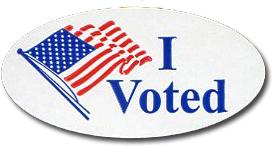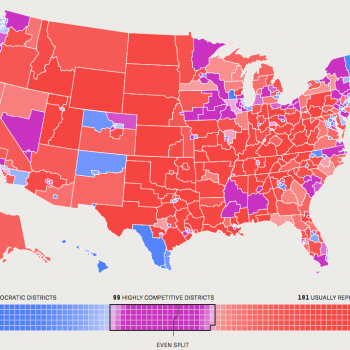Many Muslim Americans, disgusted with Obama’s policies on drones and repelled by Republican islamophobia, will be voting for a third party this election, namely Jill Stein of the Greens or Gary Johnson of the Libertarians. The appeal of voting third-party is undeniable: rather than choosing between the lesser of two evils, you are voting your conscience. This absolves you of the moral guilt of supporting a candidate, be it Obama or Romney, who enacts policies you will disagree with. And, if any third party receives 5% of the national vote in a given election cycle, they can qualify for federal matching funds the next cycle, which should help counter the rigidity of the two-party system. Right?
Unfortunately, wrong on all counts.
The reality is that no third party candidate can win the election. We can argue and debate whether that’s good or bad, but it is the reality. Maybe someday a true third party with mainstream appeal will rise, one that might be economically conservative, socially liberal, and limits foreign intervention to purely humanitarian causes. But as the Green and Libertarian parties currently exist, they cannot draw support from more than a tiny fraction of the population, and even that support is split between true believers and protest voters of conscience.
These third parties are founded on extreme ideology rather than the pragnmatic policymaking that actually solves problems. As Conor Friedersdorf wrote in The Atlantic:
Jill Stein’s “Green New Deal” … still consists largely of assertions of the utopian ends it’ll achieve, rather than realistic means for getting there. “We will transition to a sustainable, green economy for the 21st century, by adopting green technologies and sustainable production,” it states. How? Via a “World-War II scale mobilization,” she writes. So the scale is going to be comparable to 16 million or so people working full time on a green economy, roughly $5 trillion spent over four or five years toward that end, a civilian population that undergoes hardships as significant as rationing food, gas, and other basic supplies, and sacrifices comparable to the deaths of almost half a million Americans?
…
“We will proceed with utmost urgency, and put the United States 30 years ahead of the global curve,” she writes, as if such epic gains in technology and productivity can be willed. “Let the rest of the world catch up with us!” She also claims that “we can, and must, shift to an economy in which 100% of our electricity is generated renewably.” But she doesn’t explain how that is possible
The Libertarian party, meanwhile, has almost pathological views about economics:
Johnson advocates severe near-term fiscal and monetary policy austerity. When we talked at (or rather, outside of) the Republican National Convention, he told me he would cut Medicare spending by 43 percent in the short term. He repeatedly insists that “we are in the midst of a monetary collapse” and says he favors returning the United States to a (deflationary) metallic currency standard. He says he would have opposed TARP and allowed systemically important banks to fail.
In other words, if Johnson had been president in 2008, he would have allowed the U.S. financial system to collapse and the country to fall into depression. And if he became president now, he would do his best to strangle the tepid recovery we are enjoying and turn it into another severe recession.
These aren’t policies that are designed to help solve America’s problems, they are designed purely to promote ideology – something which the major parties are amateurs at in comparison. And the third parties have the luxury of their extremism, secure in the knowledge that they don’t have any responsibility to try and persuade the electorate – they remain pure. They know they can’t win and in another sense winning isn’t even the point. Even Hamas has moderated its tone by comparison, once they had the burden of actually governing. The Greens and Libertarians have no such constraints.
Now, you may argue that voting for a third party is “safe” and their extremist policies have no danger of ever being elected. Isn’t that, however, the most cynical approach to voting possible? You’re voting for people you don’t agree with and don’t actually even want to win, who don’t really plan on winning anyway, just because you want to send a message to other people with whom you might mostly agree but disagree with on one or two specific things? This makes no sense.
This is why voting third party is not a conscience vote; it’s escapism to a political fantasy. The reality is that politics is not about ideology, it is about governance. A vote for a third party in a safe state like California (if you’re liberal) or Texas (if you’re conservative) is purely symbolic and is akin to being wasted. You have achieved nothing, and no one really noticed.
A vote for a third party in a swing state is worse, however. In 2000 a vote for Nader was truly a vote for Bush, and the same holds true this year. Especially since every vote counts – remember, in 2000, as few as 537 votes could well have prevented the Iraq War. Let’s discuss moral culpability, too. If you vote for a third party in a swing state, are you somehow absolved of moral responsibility for teh actions of the candidate who wins? This, too, is a fantasy. Your symbolic vote has a real consequence just as much as if you pulled the lever for teh candidate who actually wins.
Finally, there is the 5% argument, which is what many voters in solid states use to justify their third party vote. But few people seem to realize that both the Green Party and the Libertarian Party did get matching funds in this election cycle. How did they spend their money? On bringing an end to the two-party system, or perpetuating their own niche status as symbolic protestors of pure ideology? Did the Greens or Libs pay for ads calling for electoral reforms, a federal voting holiday, or increased voter protection against suppression, with their federal matching money? The simple truth is that these third parties have the ballot access and the money they need to be viable. The thing they lack, however, is appeal.
Ultimately, the third parties are not a solution to the problem of trying to influence elected officials. The right way to do it is to engage the politicians directly, even those with whom you disagree – for example, a muslim meeting Paul Ryan. Persuasion and engagement are how you influence policy, not symbolic protests that do nothing but waste your vote at best or actively harm your own self-interest at worst. Vote your conscience in the primaries, but when it comes to the final election, we truly have to pick between two choices if we are serious about change.











